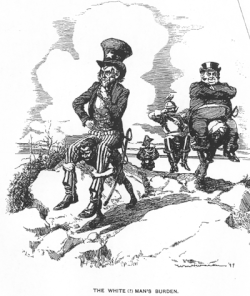Imperialism and the White Man's Burden

"Take up the White Man's burden-
Send forth the best ye breed-
Go bind your sons to exile
To serve your captives' need;
To wait in heavy harness
On fluttered folk and wild-
Your new-caught, sullen peoples,
Half devil and half child..."
Rudyard Kipling, 1899
The poet Rudyard Kipling was expressing the racist ideology of the "white man's burden" which was used to support the imperialistic thrust of the United States during the Spanish American War of 1898. The idea was that the inhabitants of the new colonies, the "half devil and half child," in this case, the Philippinos, needed the help and mothering of the wiser protector/mother, the United States. This was really just a rationalization for American imperialism.
The thinking behind the "white man's burden" is, by no means, an ideology of the past. Most times that the United States makes a move internationally, whether it be Viet Nam in the 1960s-70s, or Iraq in the present day, the move is backed up by the thinking of the "white man's burden." The United States takes on the role of the wise mother taking charge of her foolish ducklings, who are in need of some solid disciplining. The problem for the mother is that the ducklings often don't want to tow the line.


1 Comments:
A great post. Good, substantive discussion.
Kipling's poem is a warning to the American population about the responsiblities and price of empire. He believed that the American public did not understand what they were getting involved in by acquiring these distant lands from Spain. The paternalist racism of this poem expresses European attitudes towards the colonial populations. Ideas about racial superiority were an important part of American propaganda for and against the war.
Post a Comment
<< Home